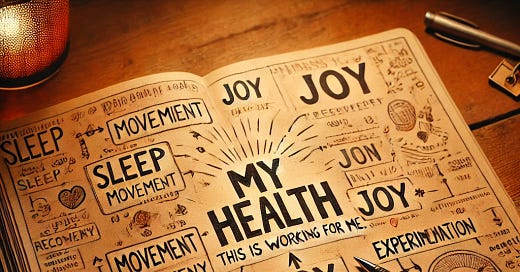Don’t Listen to Me (or Even Experts)
A standing note on how to read any of my health-related posts
Originally published Feb 2, 2019 | Refined April 2025
Because health is such a vital aspect of life—and because I’ve put a great deal of effort into improving my own—I occasionally share insights around exercise, sleep, lifestyle, and nutrition. These aren’t prescriptions. They’re observations: reports from the front lines of my own experience, shared in the hope they might offer you something useful.
But to make that useful, there’s a mindset I want to clarify from the outset—not just for you, but as a reminder to myself:
Don’t listen to me.
Or more precisely: don’t treat anything I say as definitive. And don’t treat experts that way either.
Why This Matters
I’ve only come to this mindset with real clarity in recent years. But it’s changed everything. I now approach all health content—including mine—with what I’d call respectful skepticism. It’s an attitude that makes room for insight while preserving your own judgment.
Even when engaging with true experts, the goal is not to outsource your mind. It’s to seek leads, not gospel.
What Experts Are For
To be clear: we need experts. I lean on them all the time. Specialists spend years acquiring deep, focused knowledge that the rest of us don’t have time to develop. That division of labor is essential—and often life-enhancing.
But it’s only helpful when we engage intelligently. That means understanding experts as advisors, not authorities.
An expert can offer insights that help you think better, train better, eat better. But they don’t know your goals, values, schedule, temperament, or tolerances. They know a lot—but never the full context in which you must decide. That final judgment is yours.
I owe much of this framing to Alex Epstein, whose Human Flourishing Project (especially episodes 4, 13–16) helped crystallize this for me.
How to Read My Health Posts
I am not a nutritionist, trainer, or doctor. I’ve been an athlete most of my life—mainly hockey and soccer—and I’ve experimented with many ways of eating, training, and recovering. Some of it worked. Some didn’t. And through it all, the most important lesson I’ve learned is this:
Everyone is an individual.
Our bodies, our minds, our responses—they differ more than most “experts” like to admit.
Too many people discover what works for them and then mistake it for a universal law. They assume the results they’ve achieved reflect a repeatable principle, when in reality they might be reflecting their genetics, hormonal profile, circadian alignment, or even just a more compatible schedule or stress load. If they don’t account for those variables in themselves—or in others—their advice may misfire entirely.
That’s why I never aim to prescribe. I aim only to describe. I share what’s worked for me, in my context, and I invite you to see whether any part of that could inform your own path.
We all have different bodies, lifestyles, means, likes/dislikes, goals, and many other factors which make up the context in which we are making health decisions. So my attitude is always intended to be not, “This is the right way to eat/work out” or “You should try this.” But rather: “This is what is working for me in this way. How might it apply to you in achieving your goals?”
If you read my health-related posts with that mindset, I think you’ll find something useful—even if it’s just a prompt to think more clearly about your own system.
One Final Note
I believe health is foundational. You can’t think clearly, love fully, or pursue anything worthwhile without the energy to support it. That’s why I take it seriously, and why I’m excited to share what’s helping me feel and perform better.
But I also know I can still improve—and your own experiences or questions may help me see something I’ve missed.
This isn’t a lecture. It’s a dialogue. Let’s make each other better.
TL;DR
Please don’t follow me. Think with me.




